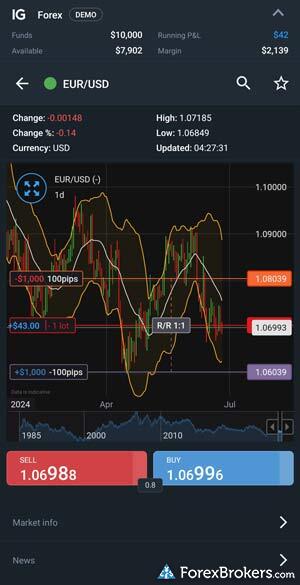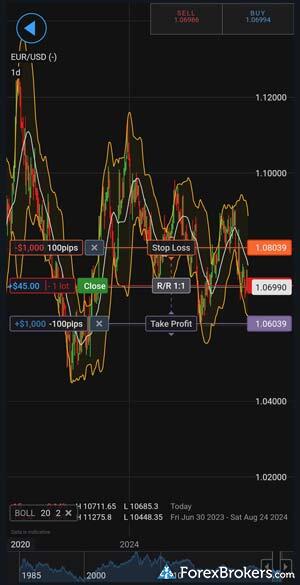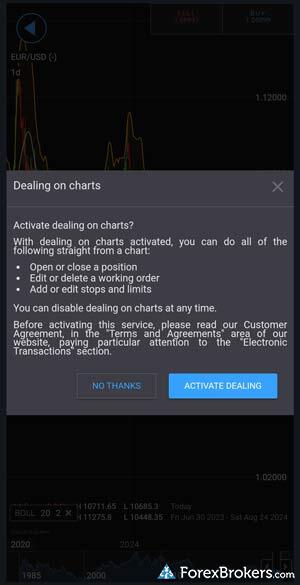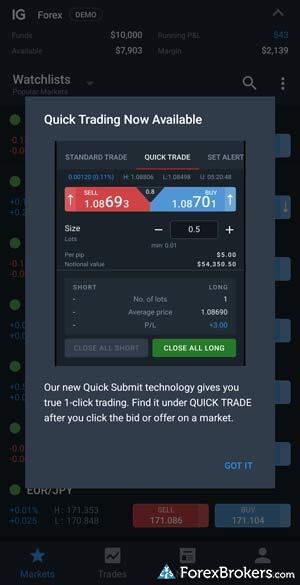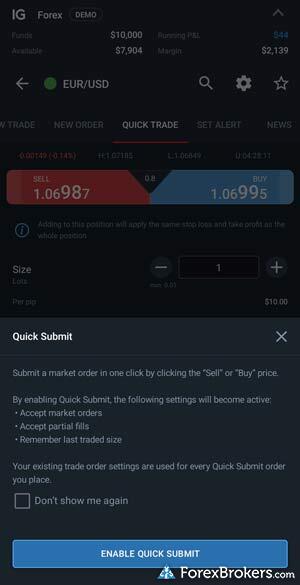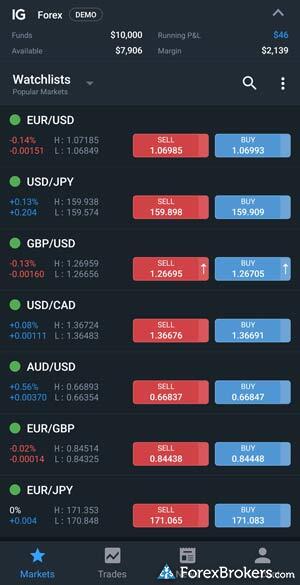Best US Forex Brokers of 2025
ForexBrokers.com has been reviewing online forex brokers for over eight years, and our reviews are the most cited in the industry. Each year, we collect thousands of data points and publish tens of thousands of words of research. Here's how we test.
The U.S. Dollar (USD) is the most traded currency in the largest financial market in the world – the global forex market. According to the latest forex market survey of central banks from the Bank for International Settlements (BIS), the USD was on one side of 88% of all trades in a global forex market with over $7.5 trillion in daily average volume (as of April 2022). As forex trading has become increasingly popular in the United States, more online forex brokers have begun offering currency-related investment products.
U.S. forex traders benefit from a robust regulatory environment designed to keep consumers and traders safe from forex scams. Before forex brokers can accept U.S. forex traders as clients, they must become registered as Retail Foreign Exchange Dealer (RFED) by the financial regulatory body, the Commodity Futures Trading Commission (CFTC) and also regulated by the National Futures Association (NFA) as a Futures Commission Merchant (FCM). The NFA website is nfa.futures.org. We recommend US residents also follow the CFTC on Twitter, @CFTC.

The CFTC is a federal regulatory agency that was established by Congress in 1974 with jurisdiction over the commodity futures (derivatives) markets. The same legislation authorized the creation of the registered futures associations, and in 1982 the NFA started as a self-regulatory organization for the US derivatives industry. For a historical breakdown here is a link to the NFA's webpage on Wikipedia.
CFDs are complex instruments and come with a high risk of losing money rapidly due to leverage. Between 51% and 89% of retail investor accounts lose money when trading CFDs. You should consider whether you understand how CFDs work and whether you can afford to take the high risk of losing your money.
Best US Forex Brokers for 2025
To find the best forex brokers in the USA, we created a list of all CFTC registered brokers, then ranked brokers by their Overall ranking.
Here is our list of the top forex brokers in the United States:
Best Forex Brokers US Comparison
Compare US registered forex brokers side by side using the forex broker comparison tool or the summary table below. This broker list is sorted by my overall rankings of the top forex brokers.
| Company | Average Spread EUR/USD - Standard | Minimum Deposit | Overall Rating |
 tastyfx tastyfx
|
0.98 | $100 |
|
 Interactive Brokers Interactive Brokers
|
0.59 | $0 |
|
 FOREX.com FOREX.com
|
1.4 | $100 |
|
 Charles Schwab Charles Schwab
|
1.35 | $0 |
|
 OANDA OANDA
|
1.61 | $0 |
|
How to Verify CFTC Registration
To identify if a forex broker is CFTC-registered and regulated by the NFA, the first step is to identify the NFA ID number from the disclosure text at the bottom of the broker's U.S. homepage. For example, here's the key disclosure text from FOREX.com's website:
FOREX.com is a registered FCM and RFED with the CFTC and member of the National Futures Association (NFA # 0339826).
Next, look up the firm on the NFA website, using the Background Affiliation Status Information Center (BASIC) tool to validate the current status of the ID number. For example, here is the official NFA page for FOREX.com, using the BASIC search tool.
About the CFTC
The Commodity Futures Trading Commission (CFTC) is a governmental regulatory organization in the United States that is authorized by Congress as the principal financial markets regulator for U.S. derivatives markets. In this role, the CFTC aims to uphold market integrity, implement efficient regulations for market participants, and reduce the potential for fraud.
The CFTC oversees a wide range of markets; commodities futures and options, foreign exchange, exchange-traded securities, and securities traded in OTC markets all come under the CFTC’s purview.
In addition to the CFTC, registrants typically must also hold regulatory status with the National Futures Association (NFA), which is a member-based self-regulatory organization (SRO) that is designated by the CFTC to help enforce compliance. Forex brokers that operate in the U.S. must be registered with the CFTC and are highly regulated, making them among the most trusted brokers globally.
Learn the forex trading basics
We’ve put together a snapshot of some important forex concepts to help get you acquainted with the basics of forex trading:
- Forex trading is the exchange of one currency for another between two parties at an agreed-upon exchange rate. One side of the trade is buying units of the base currency pair, and the other side is selling that same quantity at a mutually-agreed upon price.
- Forex Brokers are companies that are licensed by a regulatory agency (for U.S. traders, by the CFTC and NFA) to grant you the ability to buy or sell currencies through an online trading platform.
- Currency pairs are based on the price of one currency (the counter currency) for a specific quantity of units of the other (the base currency). The currency code on the left side of the pair (EUR/USD) denotes what you are buying or selling, and the one on the right (EUR/USD) represents the price – or rate – at which the base currency is being bought or sold.
- Trade sizes are expressed in units. For example, one U.S. dollar is a single unit of the USD. A standard lot is typically 100,000 units of base currency. A mini lot is 10,000 units, and a micro lot is 1,000 units.
- Spreads are typically measured in a unit called a “pip”, and they communicate the difference between the “bid” price and the “ask” price for a currency pair. Spreads, commissions, and rollover fees are ways for forex brokers to make money from forex trades. Our guide to the best zero spread brokers can help you find forex brokers with the lowest spreads in the industry.
Forex for beginners
If you are just getting started with forex trading, you can check out our popular guide to forex trading for beginners. Our beginner’s guide will introduce you to forex brokers that are great for beginner forex traders, and provides resources to help newer traders learn more about forex trading.
Is forex trading legal in the United States?
Yes, forex trading is legal in the U.S. and regulated by the Commodity Futures Trading Commission (CFTC). Forex brokers in the U.S. are required to register as Futures Commission Merchants (FCMs) and Forex Dealer Members (FDMs) with the CFTC and NFA. In addition to complying with CFTC regulations and NFA member rules, brokers that offer forex trading to retail clients in the U.S. must maintain at least $20 million in regulatory capital as a Retail Forex Exchange Dealer (RFED) with the CFTC (and as a member of the NFA). These stringent regulatory requirements have made the U.S. one of the most trusted regulatory hubs for forex traders.
Why regulation is important
Choosing a reputable, well-regulated forex broker is a crucial step towards avoiding forex scams. My educational series dedicated to forex scams shows you how to identify common forex scams and provides helpful information about what to do if you've been scammed. I also explain how crypto enthusiasts and bitcoin traders can spot common crypto scams.
Which forex brokers are legal in the U.S.A?
According to the CFTC’s most recent regulatory data (as of October 31st, 2022), there are 62 registered Futures Commission Merchants (FCMs) in the U.S., and at least six of those FCMs hold sufficient regulatory capital and the required licenses to legally offer forex trading to U.S. residents. Based on the CFTC’s own data, the following brokers offer legal forex trading in the U.S.:
- tastyfx - Legally available to retail clients in the U.S.
- FOREX.com - Legally available to retail clients in the U.S.
- OANDA - Legally available to retail clients in the U.S.
- Charles Schwab - Legally available to retail clients in the U.S.
- Interactive Brokers - Legally available in the U.S., but only to institutional clients.
- Trading.com - (U.S. brand under XM Group’s parent company, Trading Point) - Legally available to retail clients in the U.S.
How do you trade forex in the U.S.A?
To start trading forex in the U.S., it’s important to choose a forex broker that is well-regulated and licensed in the U.S. by the CFTC and the NFA. Once you’ve chosen a regulated forex broker, you can use these next steps as a guide to start trading forex in the U.S.:
- Account setup. Complete your forex broker’s account application process. Make sure to read through any applicable terms and conditions.
- Deposit funds. Once your account is set up, your new brokerage account needs to be funded. Brokers usually have multiple available deposit methods, so pick the funding method that works best for you. PayPal is a popular option for many forex traders, find out which brokers support it as a payment method by reading our PayPal guide for forex traders.
- Learn how to use the trading platform. It’s always a good idea to start out with a demo account (sometimes known as virtual trading) to familiarize yourself with the broker’s trading platform.
- Enter the forex market. Choose your desired trade size, and open a long position by clicking buy on a given currency, or open a short position by clicking sell.
- Develop a trading plan. Create a trading strategy that will enable you to trade consistently while pursuing your trading goals and managing risks. This is one of the most important factors that will determine your long-term success as a trader.
Questions to ask yourself when developing a trading strategy include:
- What are my trading goals, and how do they fit into my lifestyle?
- How will I find trading opportunities?
- How long do I want to be in the market when I place a trade?
- What is my ideal trade size based on my expected trading duration and risk/reward thresholds?
- What is the most I want to risk on a trade?
How to start forex trading
Learn more about getting started as a forex trader by checking out my in-depth Forex 101 educational series. I go over everything you need to know to start out as a forex trader; you'll learn about forex and currency trading, leverage in the forex market, how to calculate pips, and more.
Do you pay tax on forex trading in the U.S.?
Yes, U.S. residents and U.S. citizens must report their worldwide income in the U.S. – including any gains from forex trading. These can be taxed as capital gains (or may be treated as business income, if you have a corporate account). In any case, U.S. residents and/or citizens may be liable to pay taxes on any gains from forex trading – regardless of whether your broker sends you a form 1099-B.
It’s important to communicate to your tax professional the exact type of trading you are doing. For example, trading spot forex in the OTC markets may be treated differently (for tax purposes) than trading an exchange-traded forex futures contract, and certain forex contracts may be treated as a commodities contract (under Section 1256g), depending on the elections made by your tax professional.
What is the best forex broker in the U.S.?
tastyfx is my pick for the best forex broker in the U.S. in 2025. tastyfx is IG's brand for US forex traders. This means that tastyfx clients gain access to the award-winning trading experience that earned IG our #1 Overall Broker award in 2025. Though the name and logo have changed, the core business remains the same; existing U.S. clients at IG will experience a seamless transition when logging into their tastyfx account. In addition to being regulated by the CFTC and a member of the NFA, tastyfx's parent company is publicly traded, well-capitalized, and holds more regulatory licenses around the world than any of the 60+ forex brokers we review on ForexBrokers.com.
Check out a gallery of screenshots from tastyfx's trading platforms, taken during our product testing.
tastyfx offers a wide range of asset classes beyond forex trading, and consistently ranks at the top of nearly all of the categories we factor into our forex broker reviews. Read my tastyfx review to learn why we consider it to be the top choice for U.S. forex traders.
Which U.S. forex broker has the best mobile trading app?
When it comes to U.S.-regulated forex brokers, the best mobile trading app in 2025 is offered by tastyfx. Designed by IG, tastyfx' parent company, the wide range of powerful design innovations and trading tools continue to set tastyfx’s proprietary mobile app apart, such as trading signals (for U.S. traders who are interested in social copy trading), seamlessly integrated research, and a sophisticated order entry dialogue that makes managing trades a breeze. The mobile app also features the most advanced charting I’ve ever used on a mobile device.
Check out a gallery of screenshots from tastyfx's mobile trading apps, taken by our research team during our product testing.
To round out its mobile trading app offering, tastyfx also offers the popular MetaTrader 4 (MT4) app (check out our full guide to MetaTrader).
Forex trading on the go?
Mobile forex trading is more popular than ever, and many of the best international forex brokers offer multiple mobile apps and well-designed mobile trading platforms. Check out my guide to mobile forex trading to see my picks for the best mobile apps.
Which forex brokers offer MetaTrader in the U.S.A.?
The following U.S. brokers offer access to either MetaTrader 4 or MetaTrader 5 as a trading platform:
For an in-depth exploration of their differences, check out our guide comparing MT4 vs MT5.
Article Resources
NFA Wikipedia, nfa.futures.org, BIS forex market survey
Compare US Brokers
Popular Forex Guides
- Best Forex Trading Apps for 2025
- Best Low Spread Forex Brokers for 2025
- Best MetaTrader 4 (MT4) Brokers for 2025
- Compare Forex Brokers
- Best Forex Brokers for Beginners of 2025
- Best Brokers for TradingView of 2025
- Best Copy Trading Platforms for 2025
- International Forex Brokers Search
- Best Forex Brokers for 2025
Find the best forex brokers in The Americas
- Best Forex Brokers in Brazil for 2025
- Best Forex Brokers in Canada for 2025
- Best US Forex Brokers of 2025
2025 Review Methodology
At ForexBrokers.com, our reviews of online forex brokers and their products and services are based on our collected data as well as the observations and qualified opinions of our expert researchers. Each year we publish tens of thousands of words of research on the top forex brokers and monitor dozens of international regulator agencies (read more about how we calculate Trust Score here).
Our research team conducts thorough testing on a wide range of features, products, services, and tools (collecting and validating thousands of data points in the process). We test all available trading platforms for each broker – whether they are proprietary or come from third-party providers – and evaluate them based on a host of data-driven variables.
We also take an in-depth look at each broker’s commissions and fees, such as bid/ask spreads – including the average spread data for some of the most popular forex currency pairs. We research other trading costs, such as inactivity or custody fees, minimum deposit requirements, VIP rebates and/or discounts, and a range of other important fee-based data points.
Some of the other important research categories that are factored into our testing include mobile trading accessibility and capability, availability of market research and educational content, and each broker’s overall Trust Score.
All content on ForexBrokers.com is handwritten by a writer, fact-checked by a member of our research team, and edited and published by an editor. Our ratings, rankings, and opinions are entirely our own, and the result of our extensive research and decades of collective experience covering the forex industry.
Read our full explanation and accounting of our research and testing process to learn more about how we test.
Forex Risk Disclaimer
There is a very high degree of risk involved in trading securities. With respect to margin-based foreign exchange trading, off-exchange derivatives, and cryptocurrencies, there is considerable exposure to risk, including but not limited to, leverage, creditworthiness, limited regulatory protection and market volatility that may substantially affect the price, or liquidity of a currency or related instrument. It should not be assumed that the methods, techniques, or indicators presented in these products will be profitable, or that they will not result in losses. Read more on forex trading risks.






